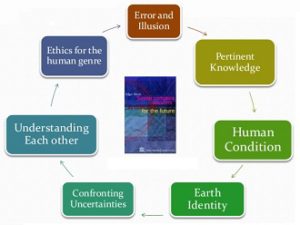
Knowledge needed for the future
It was Edgar Morin who found the masterful way or veil over knowledge, its errors and illusions, to interrupt knowledge in its principles, which is expanded in another book that talks about “global flavors and local flavors: the transdisciplinary look” (2008) .
errors and illusions, to interrupt knowledge in its principles, which is expanded in another book that talks about “global flavors and local flavors: the transdisciplinary look” (2008) .
“The seven knowledge necessary for the education of the future” (Morin, 1999) affirms this paradox that in search of knowledge embedded in illusions and errors, it affirms in the first chapter, while no second presents a gap that knowledge teaches is “not pertinent” to the student, that is, the fact that he shows within a disciplinary process that should be displayed as a whole.
The third saber is to indicate human identity, to comment on the part is curious and to speak so much about identity without mentioning the social complex in which we live as a “species” that must identify as such (from identity), perhaps the great paradigm of humanism , today in question.
This will send in chapter 4, which is the earthly identity, which lies in the importance of understanding that the disciplines (areas of specialties) must converge to a human condition, and it leads to human understanding, once in school it should be used as “ understand each other ”.
The fifth saber refers to dealing with uncertainties, students can consider a great paradox when dealing with mysteries, since a school school only dedicates to dealing with conceptual and scientific certainties, and life is always a surprise.
The sixth (and 6th. Saber) chapter involves understanding, which comes from the earthly condition, the globalization process that started with the colonization of America in the 16th century and had complex consequences (ideological, economic, social, etc.) and this must be taking us to a planetary condition.
The seventh chapter involves the ethics of mankind, he names it as an anthropo-ethics (Sloterdijk goes further and says an anthropotechnique is necessary, but falls outside this scope), the importance of citizenship in society (in Homeland-Earth goes beyond and proposes citizenship planetary) where a social conscience is needed.
Tomorrow he will be 99 years old and we are thinking of a special post for this lucid educator and thinker.
MORIN, E. (1999) Seven complex lessons in education for the future. UNESCO Pub. Available PDF.
http://www.ideassonline.org/public/pdf/Sevencomplexlessonsineducation.pdf









